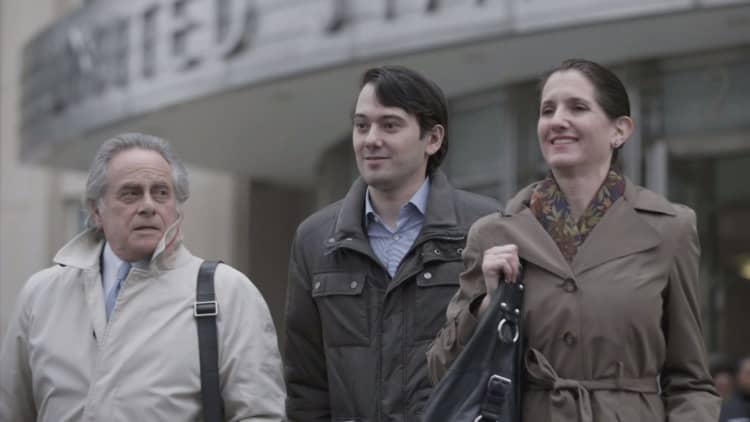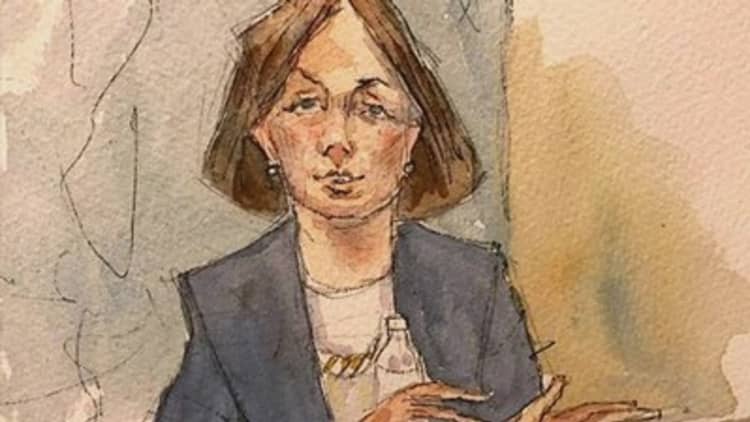
An investor in Martin Shkreli's hedge fund testified "I was not a happy camper" after Shkreli effectively refused to give him his cash back as promised.
John Neill said that after "about five months" of foot-dragging by Shkreli following a promise to redeem Neill's stake in cash, Shkreli told him in January 2013 for the first time that since the previous July he had lost more than 40 percent of Neill's stake.
And instead of giving Neill what supposedly remained in cash, Shkreli told him he was giving him more than 94,000 shares of stock in Shkreli's new drug company Retrophin.
And those shares were restricted, meaning that Neill couldn't sell them for a year.
Despite that, Shkreli suggested that Neill would be wise to think about the stock as a blessing and not a brush-off.
"Retrophin is my attempt at creating a Lowe's, Sears or Berkshire" Hathaway, Shkreli wrote in an email to Neill read aloud at Shkreli's securities fraud trial in Brooklyn, New York, federal court.
"In this case, I truly think that holding the stock is the best long-term investment," Shkreli said.
Neill thought otherwise at the time.
"I didn't know what they were worth," Neill testified.
"I was not a happy camper on this date," the Texan said. "My reaction was disappointment that it probably wasn't worth very much, because I couldn't sell it."
"I was annoyed when Martin told me he would send me cash, and he did not send me cash."
Neill, 74, is one of multiple investors who have told jurors about their experience in putting money in one of Shkreli's hedge funds, only to be stonewalled for months or more when they tried to pull their money out when he announced he was shuttering the funds in September 2012.
Like those other investors, Neill had been told by Shkreli that month he could have his stake redeemed in cash, or in Retrophin stock, or in a combination of both. Shkreli at the time was working on getting Retrophin to become a publicly traded company.
"Cash," Neill said, when prosecutor G. Karthik Srinivasan asked how he had asked for his stake to be redeemed.
But it is possible that Neill actually had little or no money left in Shkreli's MSMB Capital fund to redeem when he asked for it back.
If that is the case, he ended up being very lucky indeed since he actually ended up with a profit of about $1 million so far as a result of being given Retrophin stock instead of cash.
Prosecutors charge that Shkreli ripped off Retrophin of stock and cash to pay back investors he is also accused of defrauding at his hedge funds. Shkreli has pleaded not guilty to the charges.
Neill testified that on Jan. 28, 2011, he put $500,000 into MSMB Capital on behalf of an account held in the name of his wife, Barbara.
Days later, and unbeknownst to Neill, MSMB Capital's assets under management were effectively wiped out when it lost up to $10 million as a result of a short sale trade that blew up in Shkreli's face, other witnesses have said. The trade left MSMB Capital essentially dormant, witnesses have said.
Shkreli never told Neill about that trade and loss, Neill said Monday.
Instead, in early March, Shkreli sent him an email stating that Neill's stake had grown over the course of February to more than $522,000, Neill testified.
He continued to believe his stake was growing, and never had reason to question MSMB Capital's assets or ask for his money back, Neill testified. He noted that during the following year, Shkreli's fund was claiming to be involved in a potential acquisition to buy a company for $82 million without any financing.
"In the first year, I think his returns [in MSMB Capital] are 16 percent in the 11 months I was in," Neill said. "I was getting statements that showed through September 2012 I was up right at 40 percent."
"So I was getting good returns, even though there were some things different than what I expected, so there were not things that caused me to say I needed to send in for a redemption."
"I went in for performance, and the performance was there," Neill said.
Or so he believed.
On Sept. 9, 2012, Shkreli sent Neill an email saying that as of May 2012 — four months before — the value of Neill's state in MSMB Capital was $648,897.
Neill testified that before that, he had also received financial statements that were several months old by the time they were emailed.
"The [late] timing of the statements were a problem for me," Neill said.
Two days later,, on Sept. 11, 2012, Shkreli sent him an email saying he was closing MSMB Capital, and saying he could have his stake redeemed by that November or December, Neill testified.
"He's going to liquidate the fund, and I was going to get my money back," Neill testified.
Neill said he did not want stock in Retrophin, as offered, because he does not invest in stocks directly.
"I don't even have a stock account and I had told Martin that I was not interested in stock, I just wanted cash," Neill said.
Neill said that after repeatedly asking Shkreli for his cash, and for an update on the value of his stake in MSMB Capital, Shkreli emailed him in mid-January 2013.
In that email, Shkreli claimed that Neill's stake was as high as $756,162 in July 2012. But the email also said the stake's value had plummeted to $472,601 the following month. The value supposedly remained at $472,601 for months, until it fell again to $444,245 in December 2012, according to the email.
Shkreli also wrote that Neill's stake was now in the form of more than 94,000 shares in Retrophin.
"I'm sorry if this partnership did not turn out the way I wanted," Shkreli wrote.
Neill told jurors that "my reaction to this was like the rug had been pulled out from under me, because I've got $756,162 in July ... and then in December it's $444,245 which is a significant drop."
"It was an unpleasant surprise," Neill said.
He noted that Shkreli during the time of that purported large loss had never notified him his stake had dropped by so much. Neill said it is common for other hedge fund managers to notify investors of large fluctuations in their holdings.
Neill said Shkreli later offered him an additional 50,000 shares in Retrophin.
"He said 'I know it's been ugly, and I'll give you more shares,'" Neill recalled.
Neill said he suggested that Shkreli give the shares to the charitable foundation for underprivileged youth in Dallas that Neill runs with his wife so that Shkreli would be able to write the shares off on his taxes.
"But nothing ever happened after that," Neill said. In other words, Shkreli never donated the extra shares to the foundation, or gave them to the Neills.
Neill said that after the Retrophin shares he had received were no longer restricted, he sold 50,000 of them for about $715,000.
He gave another $350,000 worth of Retrophin stock to his charitable foundation.
And the remaining 24,000 or so shares he continues to own could be sold for "another $470,000" based on current trading prices for Retrophin, he said.
All told, Neill said, the value of the Retrophin stock he received ended up being worth about $1.57 million.
WATCH: Co-worker says Shkreli 'mentally unstable'



